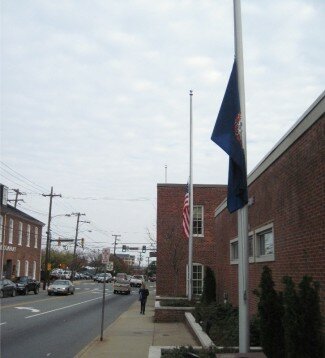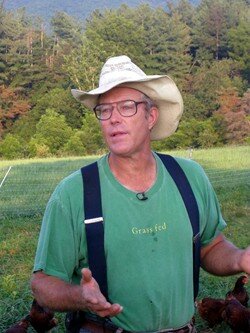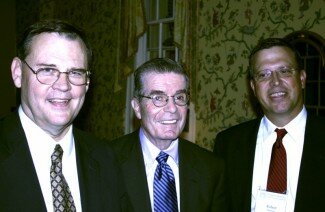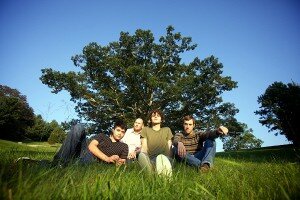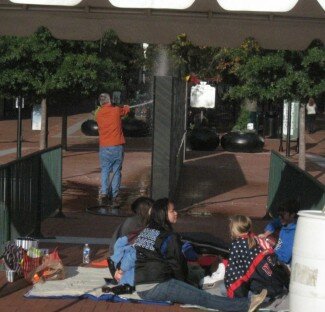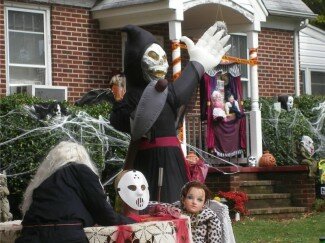
They Might Be Giants are almost regulars, coming up on their fourth time through since they began rocking Charlottesville at Trax in 1990 in support of their now near-classic album Flood, which featured such keepers as “Istanbul” and their biggest hit, “Birdhouse in Your Soul.”
But if they qualify as “regulars” in one sense, the Brooklyn-based duo appear to be zanier than ever. Witness their recent albums for kids, or even just their latest single for adults.
“The Mesopotamians” pictures Hammurabi and Gilgamesh as members of a poorly themed conceptual rock band hitting the road in a broken-down Econoline, squabbling over crappy haircuts and a last piece of gum– all the while entertaining serious delusions of grandeur.
It’s almost entertaining enough to make you forget that we’ve spent the past five years bombing the cradle of civilization to bits.
The choice of subject matter is no accident as guitarist John Flansburgh has adopted a pointedly philosophical approach to maintaining the thin veneer of comic idiocy that pervades his music. We checked in with him last week.
The Hook: Let’s start by talking about your recent kids’ albums, Here Come The ABC’s and Here Come The 123’s. What other subjects would work?
Flansburgh: Obviously, the alphabet is an incredibly rich jumping-off point. Doing the numbers was a little bit harder. We’re talking about doing sort of a science-based one, but that would have to be for older kids.
The Hook: Do you enjoy the thought of being played in middle school science classrooms?
Flansburgh: I guess so. We aren’t really that interested in being educators. But it’s an interesting way to do kids’ stuff, just because the topics are interesting, and there’s some poetry there.
The very first kids’ album we did was sort of open-ended, and although it was very warmly received, a lot of people found it a little bit confounding because it wasn’t really for any age group in particular.
The Hook: Your album No was also aimed at kids, but it was a little more free-form. Do you prefer having a theme?
Flansburgh: Having a theme is a very useful springboard. It just sparks a lot of different ideas, so it definitely creates a challenge. That same kind of challenge can be created by having a narrative theme. Any kind of theme is probably as good as any other, in a way.
The Hook: There are childish elements to a lot of your songs. Do you ever have trouble determining whether a given song is better suited for adults or kids?
Flansburgh: Adults are tough audiences, kids are tough audiences. We find that what people want out of songs from us is kind of always the same.
The Hook: So you’re kind of hoping that it will appeal to both camps?
Flansburgh: We don’t spend a tremendous amount of time thinking about how it’s going to land, if you know what I mean. We have a hard time writing songs that appeal to anybody.
The Hook: A couple of your songs appeared on Tiny Toon Adventures back in the day. That particular cartoon always had a little element of adult humor.
Flansburgh: I’m not really a fan of kids’ stuff that does this winky-wink thing over the shoulders of the kids to the adult audiences. I think we try to address kids on a very direct level.
The place where that’s impossible is at the shows, where you’re performing in front of a crowd that’s half adults and half really young children. It’s actually an extremely neurotic experience as a performer, because pretending that the parents aren’t there is a fantasy. It’s kind of hard to serve two masters.
The Hook: It seems like song cycles and themes are only one step removed from concept records and rock operas. Any chance that will be on the road map?
Flansburgh: You know, I wish we had a longer attention span. We’d probably have to collaborate with someone to have it actually make sense.
The Hook: For years, you ran a music-via-telephone service called Dial-A-Song until it was replaced by a podcast. Looking back, what are your thoughts on the switch?
Flansburgh: The thing that’s strange about the culture these days is everything’s on your permanent record. You can’t do the simplest thing without people going online and, like, rating it and discussing it and talking about its merits.
I think one of the nice things about Dial-A-Song is that we were doing it for years with very little idea what people were taking away from it. It was such a great way to get our scene together as songwriters in sort of a non-critical way.
The Hook: A few years ago, you did the “Venue Songs” project, which featured Charlottesville’s own Starr Hill Music Hall. Had you heard that it has since closed?
Flansburgh: Yeah. You know, a number of the places on “Venue Songs” have closed. It’s definitely a misguided project. I think when we started it we knew it was kind of nuts.
The Hook: When these places start closing– and you just said that Starr Hill is not the only one– how do you think that affects perception of the album as a whole? It seems kind of like doing Here Come The ABC’s, and then a few years later the ABC’s don’t exist anymore.
Flansburgh: I’m not worried about it seeming dated. We’ve seen a lot of things come and go in the last 25 years. All these bands that we came up with broke up, re-formed, did reunion tours, and are gone again.
They Might Be Giants perform at the Satellite Ballroom on March 16. $20-$25, 7pm.
#



 Comments(53)
Comments(53)
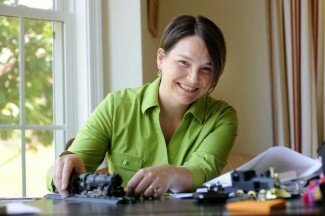 Fran Cannon Slayton
Fran Cannon Slayton

